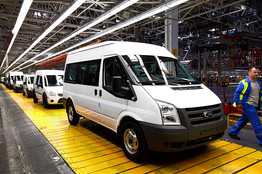CNN’s global series i-List takes you to a different country each month. In December, we visit Turkey and look at changes shaping the country’s economy, culture and social fabric.
(CNN) — It’s a long way from the streets of New York to the factories of Turkey, but this 5,000-mile journey could soon be made by all of the city’s iconic yellow taxis.
A glass-roofed, eco-friendly vehicle designed by Turkish automaker Karsan is among the three finalists in New York City’s search for a taxicab for the future.
New York launched the “Taxi of Tomorrow” competition to find a safe, energy efficient and accessible model. The winning design will be the exclusive New York City taxi for at least 10 years, according to city officials.
Karsan’s V1 is the only model that was designed from scratch for the contest.
A reflection of the country’s growing automotive ambitions, it would be Turkey’s first high-profile branded vehicle if it wins.
So far all the cars Turkey makes are built under license for major manufacturers. Karsan, while not exactly a household name outside its homeland, makes vehicles for Hyundai, Peugeot, Citroen and Renault.
“Having a vehicle designed and built in Turkey being used as a New York taxi would be a very strong branding opportunity for the Turkish automotive industry,” said Jan Nahum, executive director of Karsan.
Having a New York taxi designed and built in Turkey would be a very strong branding opportunity.
–Jan Nahum, Karsan
“It’s an incredible source of pride and passion for us,” he said of being named a finalist. “New York is probably the most popular and visible city in the world, and its iconic yellow taxis are seen in almost every picture.”
The Karsan V1 would be wheelchair accessible, spacious enough to hold five passengers and a stroller, and have a glass roof to give passengers a view of New York’s skyscrapers.
It could hold a gasoline, compressed natural gas or electric engine, depending on which technology is the greenest at any time.
Nahum said his ambition is to build taxis for other major world cities.
“We believe in the next 10 to 15 years, other cities will follow New York’s lead in looking for a dedicated taxi responding to the needs of the city,” he said.
The winner of the “Taxi of Tomorrow” contest will be the first ever custom-built New York taxi. There are 16 different vehicles from nine manufacturers in the current fleet of 13,000 licensed taxicabs.
There have been many efforts to design futuristic taxicabs over the years, but “this project marks the first time ever — anywhere — that such an exercise will be backed up by an automotive manufacturer that can turn these concepts into tangible reality,” New York Taxi and Limousine Commissioner David Yassky said in a statement when the finalists were announced last month.
The winning proposal will be announced early next year and the first new vehicles are expected to be on the road in 2014.
The V1 isn’t the only contender in the race to have a Turkey connection. Another finalist, Ford’s Transit Connect, will be built in Turkey and adapted in the United States if it wins. Also in the running is a taxi design based on a Nissan van.
Turkey’s prime role in the race to produce a new taxi might come as a surprise to New Yorkers, but the country is quietly becoming an automotive powerhouse. It’s the 15th largest vehicle producer in the world, according to Invest in Turkey, producing around 900,000 vehicles a year.
According to Nahum, the industry is planning to increase its output to 2.5 million vehicles annually within the next three or four years.
As well as home-grown companies like Karsan, many international companies, such as Fiat, Ford and Renault, have established a presence in the country, often with local partners.
Renault announced last year that it would begin production on the electric version of its Fluence car in Bursa, the so-called “Detroit of Turkey,” in 2011.
“The Turkish automotive industry has grown a lot in the last 10 years because manufacturers in Western Europe have seen it as a low-cost place to make cars and ship them to the European Union,” said David Leggett, an automotive industry analyst at just-auto.
Fiat, Ford, Renault and many others have got together with local partners and made a lot of vehicles, mainly for export.
“There’s also a lot of demand coming from Turkey’s domestic market, because the economy has boomed,” he told CNN.
via A futuristic taxi with global ambitions – CNN.com.



